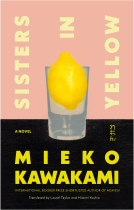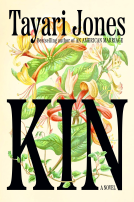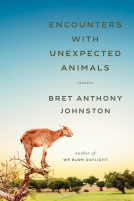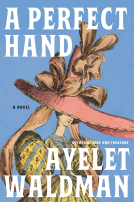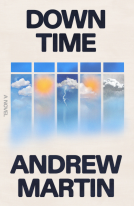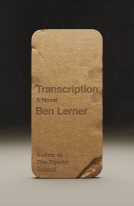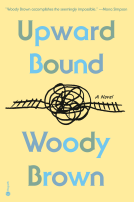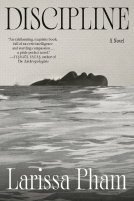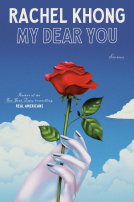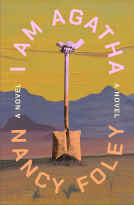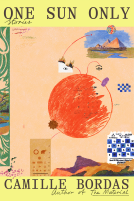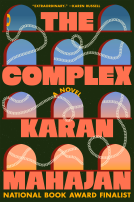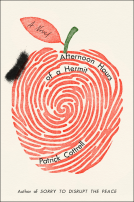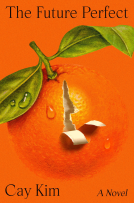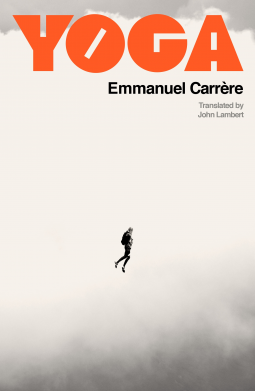
Yoga
by Emmanuel Carrère
This title was previously available on NetGalley and is now archived.
Send NetGalley books directly to your Kindle or Kindle app
1
To read on a Kindle or Kindle app, please add kindle@netgalley.com as an approved email address to receive files in your Amazon account. Click here for step-by-step instructions.
2
Also find your Kindle email address within your Amazon account, and enter it here.
Pub Date Aug 02 2022 | Archive Date Sep 01 2022
Description
Named a Best Book of 2022 by The Guardian
This is a book about yoga. Or at least, it was.
Emmanuel Carrère is a renowned writer. After decades of emotional upheaval, he has begun to live successfully—he is healthy; he works; he loves. He practices meditation, striving to observe the world without evaluating it. In this state of heightened awareness, he sets out for a ten-day silent retreat in the French heartland, leaving his phone, his books, and his daily life behind. But he’s also gathering material for his next book, which he thinks will be a pleasant, useful introduction to yoga.
Four days later, there’s a tap on the window: something has happened. Forced to leave the retreat early, he returns to a Paris in crisis. Life is derailed. His city is in turmoil. His work-in-progress falters. His marriage begins to unravel, as does his entanglement with another woman. He wavers between opposites—between self-destruction and self-control; sanity and madness; elation and despair. The story he has told about himself falls away. And still, he continues to live.
This is a book about one man’s desire to get better, and to be better. It is laced with doubt, animated by the dangerous interplay between what is fiction and what is real. Loving, humorous, harrowing and profound, Yoga hurls us towards the outer edges of consciousness, where, finally, we can see things as they really are.
Available Editions
| EDITION | Other Format |
| ISBN | 9780374604943 |
| PRICE | $28.00 (USD) |
| PAGES | 336 |
Average rating from 11 members
Featured Reviews
Writers mainly write about themselves, even if their subconscious exhibitionism hides under the cover of fictional characters. Nowadays, candidly describing one's personal experiences is seen more and more often in literature. Emmanuel Carrere is a writer who writes about himself. As he says, he never lies in his books, writing openly about his searches, fascinations, and suffering, about his friends and the women he loved. In a way, though, he writes about all of us.
"Yoga" was supposed to be a book about yoga that he had been practicing for 30 years, mainly for the benefits of meditation. Observing his breathing and feeling the airflow passing through his nostrils has made him feel calm, as if two or more parts of his personality have come to terms. The word "yoga" comes from the Sanskrit word "to yoke" and means the union of mind and body into a harmonious whole. It was that union that Carrere, like so many others, has been seeking.
The book starts with the plan of the 10-day yoga retreat. Carrere arrives without a phone, aiming to completely disconnect himself from the outside world. But his plans are abruptly interrupted after just four days with an emergency call to Paris. Soon, it turns out that the greatest threat to Carrere is the writer himself. Diagnosed as a severe bipolar case, he spends the next four months at Sainte-Anne Psychiatric Hospital, where he goes through all possible treatments, including electroconvulsive therapy. Carrere describes his disease without hiding his condition while realizing that his despair intertwines with his search for peace in yoga meditation; it is the yin and yang of his existence.
Then comes the possibility of going to a small Greek island, Leros, where Carrere meets an American historian, Frederica. An older woman dissatisfied with life, she teaches young Afghan refugees English and helps them overcome their trauma. Carrere spends his days in a modest house, talking to Erica and the four teenagers, who are also trying to navigate challenging times, just like him. Yes, a vacation, but mainly he's searching for harmony and ordinary joy again, for yang to complement yin he experienced.
Similar to another Carrere book I have read, "The Kingdom," this one is also remarkably personal. He writes about a woman with whom he has an unusual affair, his friends, especially Hevre, who was extremely important in another book, and his long-time editor's passing.
I read this autobiographical book like a fascinating novel. Once again, Carrere takes up the subject of the human condition. In "The Kingdom," the seeker is Paul the Apostle. In "Yoga," Carrere takes over this role and takes us with him on his way to Damascus. And at the end of "Yoga," there is a promise of coming love and joy - just like there was a light for Paul at the end of his search.
 Meike S, Media/Journalist
Meike S, Media/Journalist
Carrère's autofictional novel takes some wild turns: Starting out as a book about yoga and meditation, we meet the author at a retreat, from where he gets called after only five days when his (and Michel Houellebecq's) friend Bernard Maris is murdered in the Charlie Hebdo attack. After ten years of remission, Carrère's mental health issues throw him off the rails again: He is institutionalized, diagnosed as bipolar, medicated with ketamin and lithium, and he receives electroconvulsive therapy. After leaving the hospital, he travels to a Greek island to help during the refugee crisis: He now seeks deliverance not in himself, but in helping others (and don't think that the book is simplistic enough to sell that as the answer - clearly not).
As a yoga enthusiast myself, I liked the idea to write a book about a man striving for control and inner peace who in the end is confronted with the most terrible truth of yoga: That yoga is always a practice, that the person who claims to "know" how to do yoga only reveals to be ignorant about it - a yoga practitioner always trains, and never fully masters his craft, because humans are imperfect and forever trying to deal with a challenging world full of randomness. What happens to Carrère is horrible, he struggles with severe mental health issues and goes down a suicidal spiral. He reflects on his life which suddenly turns from looking happy to looking nightmarish.
Carrère ponders the meaning of happiness, especially in the context of family, romantic love, and literary success, but the disparate text does not become meandering or narcissistic, it remains tentative and highly introspective. It's an unusual approach to autofiction that operates on emotional extremes and aims for control, over one's own mind or at least over one's own narrative.
So my fave literary critic Ijoma Mangold was right: This is fascinating stuff.
 Jim B, Reviewer
Jim B, Reviewer
Thanks to Netgalley and FSG for the ebook. The story, which mirrors the author’s life broadly, is told in four parts. The first is a visit to a ten day silent retreat as he does research for a book on yoga that he’d like to write. The retreat is interrupted in the second part when the killing at Charlie Hebdo kills an old friend and also, separately, a powerful affair comes to an abrupt end. As his life falls apart around him, the author checks into a hospital for his depression in the third part. Out of the hospital, the fourth part mainly finds the author teaching English to refugees in Greece as he starts to finally make sense of his life once again. A startlingly honest book that is moving in its honesty.
This is the first book by Emmanuel Carrère that I've read. I already knew that he'd created controversy, part of which is the reason for not writing about his ex-wife, as mandated by court order.
I also knew, before starting reading *Yoga*, that Carrère has written a book about Jean-Claude Romand, a man who murdered his parents, wife, and children.
I didn't expect this to be the book that explained meditation to me.
I've previously learned about meditation through lectures and books on hinduism and buddhism, but never quite delved into a world that's *become* meditation, where I've become immersed in both meditation and Carrère's style.
> Everything that happens inside you during the time you remain seated, silent and motionless, is meditation. I’ve often looked for a good definition—as simple, accurate, and all-encompassing as possible—and while there are others that I’ll unpack as this story progresses, this one seems to # Jean-Claude Romandbe the best to start off with because it’s the most concrete and the least intimidating. I repeat: meditation is everything that happens inside you during the time when you’re seated, silent and motionless. Boredom is meditation. The pains in your knees, back, and neck are meditation. The rumbling of your stomach is meditation. The feeling that you’re wasting your time with bogus spirituality is meditation. The telephone call that you prepare in your head and the desire to get up and make it are meditation. Resisting this desire is meditation—giving in to it isn’t, though, of course. That’s all. Nothing more. Anything more is too much. If you do that regularly, for ten minutes, twenty minutes, half an hour a day, then what happens during this time when you remain seated, silent and motionless, changes. Your posture changes. Your breathing changes. Your thoughts change. All of that changes because in any case everything changes, but also because you’re observing it. You don’t do anything in meditation, the key thing is not to do anything, except observe. You observe the appearance of your thoughts, your emotions, your sensations in your field of consciousness. You observe their disappearance. You observe what buoys them up, their points of reference, their convergence lines. You observe their passing. You don’t cling to them, you don’t repel them. You follow the flow without letting yourself be carried away by it. As you do that, it’s life itself that changes. At first you don’t notice. You have the vague feeling that you’re on the cusp of something. Little by little, it becomes clearer. You detach a little, just a little, from what you call yourself. A little is already a lot. It’s already enormous. It’s worth it. It’s a journey. At the start of this journey, a Zen saying goes, the distant mountain looks like a mountain. As the journey unfolds, the mountain never stops changing. You no longer recognize it, it’s replaced by a series of illusions, you no longer have any idea where you’re heading. At the end of the journey it’s a mountain once again, but it has nothing at all to do with what you saw from a distance, long ago, when you started the journey. It really is the mountain. You can finally see it. You’ve arrived. You’re there. You’re there.
We follow the author as he's made way to a silent retreat: ten days of silence, no mobile phones, no note-taking. He breaks some rules, but still, is devoted to trying out what's before him.
I say Carrère's style is partly French, partly stream-of-consciousness, partly in-the-moment. It's close to existentialism, the essay writings of Michel de Montaigne, the novels of Thomas Bernhard, the diaries of Bodil Malmsten, and the travel notes of Anthony Bourdain.
The author goes into the silent retreat with yoga and meditation experiences. Yet he doubts that he'll make it all the way through.
> Seventh definition of meditation: paying attention. The philosopher and mystic Simone Weil said that that’s the real point of studying: not to learn things—we already know enough—but to hone our skill at paying attention. The East knows more about this than the West.
Long paragraphs come into play and immediately forced me to recognise my own way of reckless thought as I've attempted meditation. I've only done it a couple of times, but I did recognise the way in which my own thoughts began to venture after a while:
> The air enters my nostrils. I observe it as it enters. The air leaves my nostrils. I observe it as it leaves. It’s calm, regular. I observe how it brushes against the inside of my nasal cavity. It’s light, delicate. Nostrils have a large number of nerves, so there’s plenty to pay attention to. There’s always something happening there. You can meditate for two hours on your nostrils without getting bored. This session is off to a good start: my nostrils are my best friends. Once you’ve left the entrance and delved a little deeper into the cavities, they widen into huge caverns. The more you explore them, the farther you move along their walls, the bigger they get, and the more you feel: prickling, bristling, tingling. Pulsing, even: yes, a pulsing feeling that just about obscures all the rest. Something’s pulsing. I observe this something. I identify with this pulsing. It’s not at all unpleasant, observing it isn’t unpleasant either. It’s good. It’s good, except that my posture has slumped. Sagged. I have to straighten out, without ceasing to pay attention to my breath as it enters my nostrils or the pulsing at the back of my nasal cavity. I stretch my spine, thrusting the top of my head skyward. It’s a lot to do all at the same time, and my mind takes advantage of this congestion to slip away. My mind never stops slipping away. It slips away from the now, from the real—which is the same thing, because only what is now is real. The Tibetan master Chögyam Trungpa used to say that we dedicate 20 percent of our cerebral activity to the present. As for the remaining 80 percent, with some people it’s focused on the past, with others on the future. I, for one, spend a lot of time thinking about the future and not much about the past. Nostalgia is foreign to me. One could see that as the mark of a confident, optimistic, forward-looking person. But I fear that with me it’s more the mark of an obsessive, because while everyone knows you can’t change the past, you can always hold to the illusion that you can control the future. To keep myself from slipping down that slope, I often repeat to myself the great Jewish maxim “You want to make God laugh? Tell him about your projects.” But that doesn’t stop me from continuing to make him laugh. When God wants to lift his mood and have a good laugh, I’m sure he looks over at me, sitting on my zafu, focusing on my breathing and the inside of my nostrils while thinking about my upbeat, subtle little book on yoga. Its format, its chapters, its subheadings. I’m already thinking up sentences, wondering how many definitions of meditation I’ve got now, and it’s at this moment I realize that my thoughts have got the better of me: past, present, Chögyam Trungpa, tell God about your projects, my next book, what will be in it, how successful it will be … Time to come back to my nostrils. Time to come back to the air as it enters my nostrils. Inhale, exhale. The air is a little cooler when it enters, a little warmer when it leaves, after the long path it’s taken inside me. Outside. Inside. When is it still outside, when is it already inside? Eighth possible definition of meditation: observing the points of contact between what is oneself and what is not oneself. Between the inside and the outside, the interior and the exterior.
Carrère dips into writing about writing, in part because he's an author, and, I suspect, in part because meditation and yoga is about introspection, how you consider every single atom and thereby going outside of yourself.
> A long time ago, when I was just starting out as an author, I came across a piece of advice to apprentice writers, which I love, quoted by Freud. He cites a certain Ludwig Börne, who was a minor figure of German Romanticism. Like Glenn Gould’s maxim about the state of wonder and serenity, these words have been a sort of mantra that has accompanied me for much of my life: Take a few sheets of paper and for three days on end write down, without fabrication or hypocrisy, everything that comes into your head. Write down what you think of yourself, of your wife, of the Turkish War, of Goethe, of Fonk’s trial, of the Last Judgment, of your superiors—and when three days have passed you will be quite out of your senses with astonishment at the new and unheard-of thoughts you have had. This is the art of becoming an original writer in three days.
>
> Writing down everything that goes through your head “without fabrication” is exactly the same as observing your breathing without modifying it. Which is to say: it’s impossible. Still, it’s worth trying. It’s worth spending your whole life trying. That’s what I do, it’s my karma, I can’t do anything else but use words to make sentences, sentences to make paragraphs, paragraphs to fill pages, pages to make chapters, and—if I’m lucky—chapters to make books. I think about it all the time. The two biggest parts of my mental pie are dedicated to thoughts about work and fantasies about sex.
While reading the book, I was often disturbed by how Carrère jumped back and forth between things, granted, as humans often do when thinking about subjects. While writing *Yoga*, he's diagnosed with bipolar disorder. This goes into the book. A lot of quotes go into the book. How he thinks of sex goes into the book. The trauma of dealing with the death of friends from the so-called Charlie Hebdo massacre goes into the book as well. Everything could. Everything's up for grabs with Carrère.
Yet, a near-masterful writer is required to not let a book like this result in sloppy deluge. Sure, I think Carrère could, at times, have pulled in the reins and cut out a bit of chaff, but on the whole, the chaff makes the wheat shine extraordinarily well; I'm not saying there's too much fluff here, but...
There is original thought in the book. There is analysis. There's a lot of twists and turns that made me revel and turn in wonder, time and time again. And there is chaff.
I will definitely read more of Carrère's work, and this is likely a good introduction. As a standalone work, it's memorable and highly subjective.
Readers who liked this book also liked:
Patrick Cottrell
General Fiction (Adult), LGBTQIAP+, Multicultural Interest
